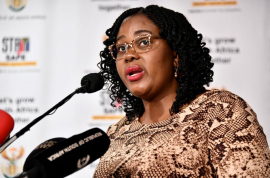
Human Settlements Minister Mmamoloko Kubayi will approach the Special Investigating Unit (SIU) to conduct an investigation in all department’s entities where there are claims of wrongdoing and corruption.
“I have said elsewhere that wrongdoing and corruption will be dealt with, without fear or favour and I encourage those with any evidence of wrongdoing to take the information to law enforcement agencies,” Kubayi said on Friday.
Briefing the media on policy amendments coming into effect from 01 April 2022 and various issues affecting the department, Kubayi said due to long periods of poor leadership and instability in some of the housing boards, a destructive culture has germinated within the entities.
“I am speaking of the culture of rumour mongering, fictitious grievances, media leaks and unsubstantiated and frivolous whistle-blowing that has taken root.”
While she strongly believes that wrongdoing and corruption must be dealt with decisively, Kubayi warned that channels for exposing such should not be abused for agendas that have little to do with fighting wrongdoing and corruption.
“Since arriving in this portfolio, I have been bombarded with allegations and counter- allegations of corruption which are then leaked to the media. What is common about these allegations is that no evidence is ever produced to support them and yet I spend hours responding to media enquiries about these allegations.”
The stabilisation effort has also been made difficult by the existence of “well-entrenched patronage and corruption networks” that are putting up a fight.
Board appointments
The Minister also announced the appointment of boards in five of the department’s entities, including the Housing Development Agency, Social Housing Regulatory Authority, Community Schemes Ombud Service, Property Practitioner Regulatory Authority and the National Home Builders Registration Council.
Cabinet has also approved the appointments of the National Housing Finance Corporation (NHFC) Board. Kubayi said the board will be formally appointed for a period of three years at the NHFC Annual General Meeting to be held next week Tuesday.
The Minister also acknowledged that the appointment of boards does not automatically bring stability to the entities, but is an important step in the right direction.
“Most of these entities have multiple vacancies at an executive level, some do not have the necessary technical skills to execute their mandate and yet others have organisational structures that are wholly unsuitable for the execution of their mandate.
“I have mandated the boards of these entities to make finding solutions to these challenges their number one priority,” Kubayi said.
Bulk infrastructure allocation increased to 5%
In a bid to resolve the problem of incomplete and complete projects that have not been occupied due to lack of bulk infrastructure, Kubayi announced that the structure of Human Settlements Development Grant (HSDG) has been reconfigured to allow bulk infrastructure delivery, and that allocation for bulk has increased from 3% to 5%.
Backed by a good plan, the allocation could be increased up to 30% of the grant, especially in rural provinces.
“In the financial year 2022/23, we will start implementing front-loading in Northern Cape and the Eastern Cape under the Infrastructure Fund, which will allow us to significantly increase the scale of housing delivery in a short space of time. This means that these provinces can start implementing their plans utilising the budgets for the next two financial years,” she said.
Qualification criteria for household income revised
Meanwhile, Kubayi announced that the department has revised the bands for households earning from R1 850 to R22 000 gross monthly income. The previous criteria for household income was from R1 500 to R15 000.
“Since the last adjustment of the qualification criteria in 2018, tenants are struggling to pay their rentals due to inflation and substantial increases in utility costs. This [revision] will align with the broader definition of the affordable housing programmes such as FLISP (Finance Linked Individual Subsidy Programme),” Kubayi said.
FLISP is a housing subsidy for first-time homebuyers to assist with purchasing a home. For buyers to qualify, they have to fall within a certain income bracket that is considered as the gap market or the missing middle. – SAnews.gov.za


